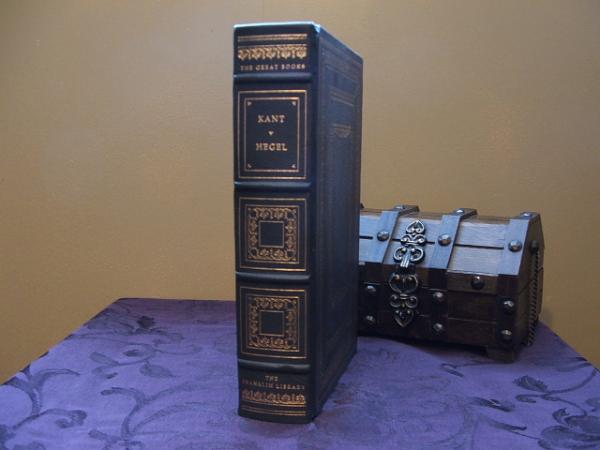Easton Press Georg Wilhelm Friedrich Hegel books
Phenomenology of Spirit - Books That Changed The World - 1995Logic - The Great Philosophers - 1995
Franklin Library Georg Wilhelm Friedrich Hegel books
Works of Georg Wilhelm Friedrich Hegel and Immanuel Kant - Great Books of the Western World - 1985
Georg Wilhelm Friedrich Hegel biography
Georg Wilhelm Friedrich Hegel, born on August 27, 1770, in Stuttgart, Württemberg, was a German philosopher who played a crucial role in shaping the landscape of Western philosophy. His innovative and complex ideas have had a profound impact on various fields, including philosophy, political theory, theology, and history. Hegel's early education included studies in theology and philosophy at the University of Tübingen, where he formed friendships with notable contemporaries such as Friedrich Schelling and Friedrich Hölderlin. Influenced by the intellectual currents of his time, particularly the German Romantic movement and the ideas of Immanuel Kant, Hegel embarked on a journey to develop a systematic and comprehensive philosophical system.
In 1801, Hegel began his career as a lecturer at the University of Jena, where he started to articulate his philosophical ideas. His seminal work, Phenomenology of Spirit (1807), introduced his dialectical method, a process of thesis-antithesis-synthesis through which ideas evolve and develop. This work marked the beginning of Hegel's reputation as a profound and challenging thinker. Hegel's most significant contributions came with his development of absolute idealism and his conceptualization of history as a rational and purposeful unfolding of human freedom. His major work, The Science of Logic (1812–1813), delved into the nature of thought and reality, while The Phenomenology of Spirit explored the development of self-consciousness and the evolution of human consciousness.
In 1816, Hegel was appointed to a professorship at the University of Heidelberg, where he continued to refine and expand his philosophical system. His lectures covered a wide range of subjects, including aesthetics, philosophy of history, and the philosophy of religion. Hegel's political philosophy is encapsulated in his work "Elements of the Philosophy of Right" (1820), where he explores the nature of the state and the concept of freedom within a social and political context. He argued for the idea that the state represents the realization of human freedom and ethical life.
Hegel's influence extended far beyond his lifetime, impacting subsequent philosophical movements such as existentialism, Marxism, and phenomenology. His dialectical method and emphasis on historical development left an enduring mark on intellectual thought. Georg Wilhelm Friedrich Hegel passed away on November 14, 1831, in Berlin. Despite the complexity of his work, Hegel's ideas have continued to stimulate debate and scholarly inquiry, solidifying his place as one of the key figures in the history of philosophy.
Phenomenology of Spirit
Perhaps one of the most revolutionary works of philosophy ever presented, The Phenomenology of Spirit is Hegel's 1807 work that is in numerous ways extraordinary. It begins with a Preface, created after the rest of the manuscript was completed, that explains the core of his method and what sets it apart from any preceding philosophy. The Introduction, written before the rest of the work, summarizes and completes Kant's ideas on skepticism by rendering it moot and encouraging idealism and self-realization. The body of the work is divided into six sections of varying length, entitled "Consciousness," "Self-Consciousness," "Reason," "Spirit," "Religion," and "Absolute Knowledge." A myriad of topics are discussed, and explained in such a harmoniously complex way that the method has been termed Hegelian dialectic. Ultimately, the work as a whole is a remarkable study of the mind's growth from its direct awareness to scientific philosophy, proving to be a difficult yet highly influential and enduring work.
In The Phenomenology of Mind defied the traditional epistemological distinction of objective from subjective and developed his own dialectical alternative. Remarkable for the breadth and profundity of its philosophical insights, this work combines psychology, logic, moral philosophy, and history to form a comprehensive view that encompasses all forms of civilization. Its three divisions consist of the subjective mind (dealing with anthropology and psychology), the objective mind (concerning philosophical issues of law and morals), and the absolute mind (covering fine arts, religion, and philosophy).
This brilliant study of the stages in the mind's necessary progress from immediate sense-consciousness to the position of a scientific philosophy includes an introductory essay and a paragraph-by-paragraph analysis of the text to help the reader understand this most difficult and most influential of Hegel's works.
Science of Logic
Most of the major schools of contemporary philosophy, from Marxism to Existentialism, are reactions to Hegelianism and all, if they are to be understood, require some understanding of Hegel's Logic. From its first appearance in 1812, this work has been recognized by both admirers and detractors alike as being the absolute foundation of Hegel's system.
Hegel's Logic constitutes the foundation of the system of philosophy presented in his Encyclopaedia of the Philosophical Sciences. Together with his Science of Logic, it contains the most explicit formulation of his enduringly influential dialectical method and of the categorical system underlying his thought. It offers a more compact presentation of his dialectical method than is found elsewhere, and also incorporates changes that he would have made to the second edition of the Science of Logic if he had lived to do so. This volume presents it in a new translation with a helpful introduction and notes. It will be a valuable reference work for scholars and students of Hegel and German idealism, as well as for those who are interested in the post-Hegelian character of contemporary philosophy.

Comments
Post a Comment
Share your best book review and recommendation